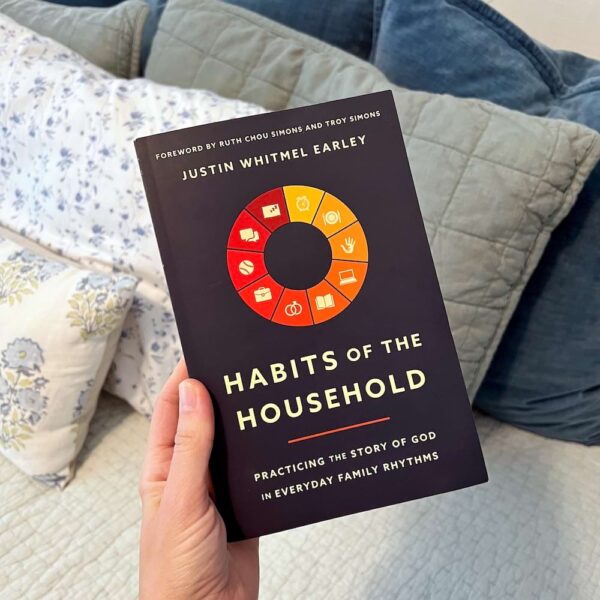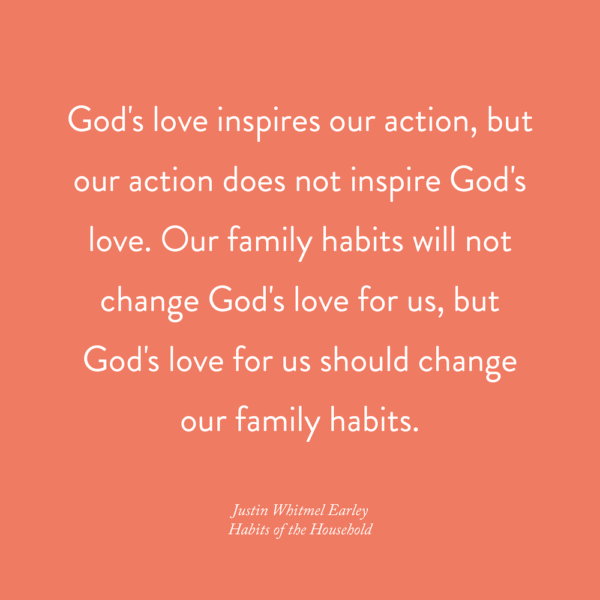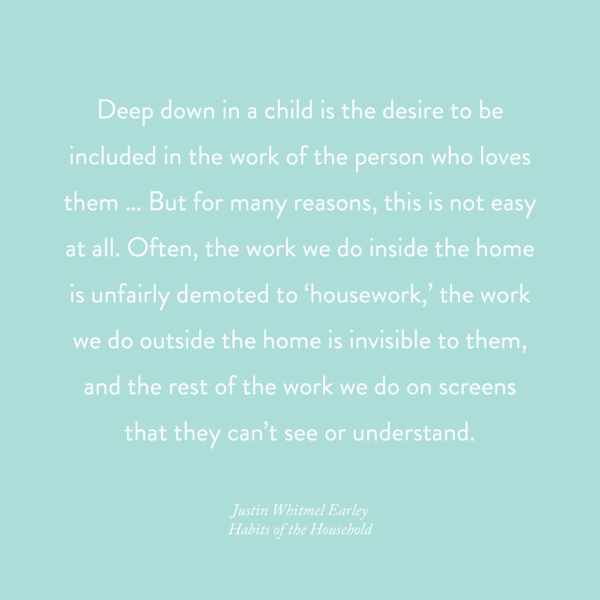My takeaways from Habits of the Household
If you hang out in the same corner of the internet as me (and hi, if you’re reading this, you probably do) then you have certainly seen Habits of the Household recommended. I’m here to say it’s with good reason! With chapters covering Waking, Mealtime, Discipline, Screentime, Work, and more, this book is packed full of actionable and simple ideas for implementing purposeful family habits in even the smallest moments. After reading two of his books (and preordering the newest one!), Justin Whitmel Earley has earned his spot on my list of trusted authors and I am jazzed to discuss Habits of the Household today.
To keep things organized (because I could truly go on and on), I’m going to give you four reasons I loved this book, four takeaways, and three suggestions. Let’s go!

Four Reasons I Loved Habits of the Household
1. The writing. For me, Justin’s passionate yet elegant writing makes this book. He is earnest and genuine, and his heart for what could be a dry topic comes through so clearly. He wears the dual roles of relatable dad and thoughtful expert beautifully: with a wife, four young boys, and a full-time legal career, it’s clear he is living the struggles and triumphs right alongside his readers. This work matters to him – and he has so many anecdotes and experiments to share – because he’s in the thick of it, too.
2. The practicality. For as beautifully written of a book as this is, it is extremely practical. It’s also meticulously organized – easy to read and apply even as it packs in a ton of information and ideas. I love how the ten chapters move chronologically, covering habits from Waking to Bedtime. Each chapter offers thoughts on the significance, opportunities, and potential pitfalls of an aspect of the household, presents some ideas for character- and family-forming habits, and then neatly sums everything up at the end of the chapter with the main idea, key takeaways and images, things to try, sample scripts, potential boundaries or expectations, and further resources.

3. The reminder of grace. If you struggle with legalism (the idea that your good works alone can ingratiate you with Jesus), then you might approach a book about habits of faith with apprehension. Justin heads that off by including the above reminder in the summary of every single chapter, and I think it’s perfect in its concision and clarity. He’s relentless in his belief that good habits are worth developing and equally relentless in his insistence that they don’t replace relationship.
4. The epilogue. He really brings it home at the end, touching on several of my pet themes: time, intentionality, the big picture (the family-age chart exercise is eye-opening, isn’t it?). And then he goes and references one of my favorite lines of scripture in a passage I’ve highlighted and starred in my copy:

I love this. I love it. I love that he speaks to the weight of our role without weighing us down. I love that he takes our duties as parents seriously, but remains lighthearted. I love that he points to the finitude of time without panicking. And I love how he closed with memories of his dad, tying it all back to Jesus in the most beautiful, affecting way.
Four takeaways from Habits of the Household
This is a book I will be returning to over and over, and I imagine I’ll take away something new each time as our kids move through different stages. But here are four favorite takeaways I had on my first read-through: either new practices we implemented, or particular encouragements to keep on our current path.

1. WAKING | The waking chapter was one of my favorites, and resulted in two of my most tangible new habits: a short kneeling prayer at the side of my bed first thing in the morning (I literally roll out of bed onto my knees, ha) and the family blessing before leaving for school/preschool/work. When we were first establishing the habits, post-it notes on my bedside table and on the wall near our front door served as helpful cues.
My favorite part about the blessing is that – just as Justin says – it noticeably changes my heart posture towards the kids in the moments leading up to it. It’s hard to snap at someone to PUT ON THEIR SHOES when you know you’ll have to hold hands and pray together ten seconds later :)

2. SCREENTIME | This chapter did not disappoint – I was nodding along with every page. Though I loved his thoughts on curation and many of the habit suggestions (like watching through the end of the credits!), what stuck with me most was the idea that setting screen time and curation limits is a way for the parent to take on pain now so that their kids don’t have to later.
As a parent, it’s often much easier (in the moment) to allow more screen time. It is much harder to say no, to enforce limits, to create the conditions for solo or group play away from screens. “We aid our children’s formation in character, wisdom, emotional intelligence, and creativity,” Justin says, “by intervening as parents and taking the inconvenience of saying, ‘Yes, this is going to mean I get fewer breaks and have to be more involved and have to manage constant requests, but this is for their formation, which means it is a fight worth fighting well.” This chapter gave me words for and even ennobled what can feel like a never-ending slog.

3. WORK | I loved this chapter so very much – it had many echoes of Hunt, Gather, Parent, and bolstered my belief that kids would almost always prefer to be doing something alongside a parent, invited into their work, than shunted off to the side or occupied with an activity designed for kids. For Shep, especially, we have noticed that one of the best ways to deal with any miscreant behavior is to redirect it into helping us in some way – drawing him closer and putting him to work instead of sending him away.
This chapter also encouraged me to just talk about work more, especially at the dinner table. Just as we ask our kids about their days, we can tell them about ours and actually include some real details.

4. PLAY | The opening of this chapter is beautiful – all about the importance of a playful Christian imagination, how “in Christianity, you won’t get very far without a healthy imagination.” And that is not because the story of God is made up, but because it is so very real: “the world is so much more than meets the eye. This is the wisdom of all fairy tales and of any good kids’ movie – that things are more than they seem. Extraordinary things are patiently waiting, right here in this reality, to be discovered … Play is thus a way to reenchant a disenchanted world.”
This chapter had echoes of Sally Clarkson for me, and I loved it. It gave me encouragement to keep on the track we’re on, ensuring plenty of margin and scaffolding for imaginative play and curating life-giving imaginative stories.
Three Suggestions for Reading Habits of the Household
1. Start small | It’s hard for me to imagine someone having a complaint about this book, but if they did, I imagine it would be that there are too many good ideas to choose from and it feels overwhelming to know where to start. I suppose in some ways this didn’t seem like an obstacle to me, because I write about habit formation and goals as a career, but I also get it – there are a LOT of really great ideas packed in here!
The encouragement I’d give you is this (the same advice we liberally dole out at Cultivate and that Justin underlines, too): start small. Pick 1-3 things you’d like to try and just try them. If they stick? Great! If you find they’re not quite right for your family, that’s okay. Go back and pick something else. And once you’ve mastered those, you can move on to something else. This is a long game, and it’s okay to go slow.
2. Don’t worry about your kids’ reactions | Perhaps my children are just used to my *interesting* ideas and experiments when it comes to their household and routines, but in general, I think kids are extremely adaptable. They’ll accept most new things without batting an eye! And even if there’s initial skepticism or resistance, it’s okay! Keep going! They’ll adjust – they really will. I was a bit worried about how to introduce the morning blessing and whether our kids would think it was weird, but they just rolled with it.
3. Read with a friend | Earlier this year, a friend invited me to read Habits of the Household alongside her. I was flattered and excited, and immediately said yes – but I had no idea how good it was going to be. Our two-person book club has met several times over the last few months – usually while walking or bike riding – to discuss a handful of chapters at a time. We share our favorite parts, what stuck out to us, what felt hard to swallow. We talk about new things we’re trying and swap practices that have been successful in our families.
I cannot recommend this approach to the book more. It is GREAT accountability for actually implementing new things, it will be an encouragement to you in the good work you’re doing of leading and shaping your family, and it will absolutely bring you closer to your friend. Highly, highly recommend. Grateful for you, Elisha!!
Friends, we get to decide the culture in our homes, and that is a great responsibility and a great privilege. We can form our children in God’s love. We can train them in meaningful relationships. And, as Justin says, we can create homes that are missional lights in a dark world. Habits can help, and so can this book. If you decide to pick it up, I hope you really love it! And if you’ve already read it, I’d love to hear your favorite part!
Affiliate links are used in this post!




















Bought this before even finishing your review! Cannot wait to dive in!
Cannot wait to discuss!
This is such a good review Emily, thank you!
One question – when would you wished you have read this? We have a 2 year old, with our second due in 2 months – would this be a good time to read it, or would you suggest holding off a bit until kids are older?
Personally, I like to be prepared, and always prefer to read advice before I enter the stage! :) For this book, some things will more applicable when your kids are older, but they are also things you could implement today!
I listened to this book and loved it, but I did feel a little overwhelmed at times with all the great ideas. I think a slow re-read with a physical copy of the book to mull over and make notes in and refer back to might be the ticket for me. Then I can take time to really think about what I can implement in our home little by little. I can tell this book is right up your alley! I appreciate the author’s organized and clear writing style with no extra “fluff”/unnecessary repetitiveness. His heart for faith and parenting really shines through.
I agree, Julie! I’m already biased towards physical books but I found it especially helpful to mark this one up and take it slow!
I loved this book! I could appreciate that, when summed together, the suggestions in the book could seem overwhelming. Yet, like in ‘the Common Rule’, many of the suggestions can be habitualized. In that sense, with some practice, they become manageable (and “meaningful and manageable” is a filter I like to put all ideas through ;) )
I have a question for you, Em, or perhaps a suggestion for a blog post in the future. I’d love to hear more about your reading habits in general. Things like: finding time for reading, do you take notes (and, if so, where), how do you derive your reading lists, how do you enact the suggestions read, etc. I’d be interested to hear from other readers also (as we seem a likeminded bunch!). I love to read and endeavour to always have a book or two on the go. Yet, different seasons of life (e.g., writing a dissertation, having babies and enduring sleepless nights) necessitate different strategies. I love hearing other readers’ tips and tricks in their current seasons!
I’m currently reading “Family Discipleship” by Chandler & Griffin and it, too, is excellent. It has a similar approachable and practical feel, but with a very strong introduction that underscores some of the theological underpinnings and imperatives we have as parents to be intentional in raising our children. I highly recommend it!
Oh! And one additional question re: reading habits – do you purchase all the books you read? How do you budget for this?
I find that many of them I can get via the library but in different formats (e.g., audiobooks, ebooks). I certainly prefer my own written comments for note-taking but find that books would otherwise eat up a considerable portion of our family budget!
Thank you for the Family Discipleship rec, Christina! I’m a fan of the Family Discipleship podcast and this book has been on my radar! I did write a post in 2019 about how I read – most of it still holds up, but you gave me a few ideas for future posts! https://emformarvelous.com/how-i-read/
Thank you for this excellent review! I’m currently waiting for my hold being available at the library. But now I’m thinking this might be a book I want my own copy of!
Loved this review, Em! Sounds like you and Justin are definitely kindred spirits. I resonated with something you mentioned in the Screens chapter. I grew up in a household where TV was intentionally watched if turned on, my husband grew up with the TV always on, no matter if anyone was watching or not. As you can imagine, this has sparked some interesting debates in our TV habits :)
I’ve realized recently that my passion for this subject is around the idea of media being consumed as thoughtfully as it was curated. Movies and TV shows (particularly good ones) take months, if not years to write, shoot, edit, create. I feel as though sitting down and carving out intentional time to enjoy them gives them the respect they deserve and can teach our kids about how to honor entertainment as a medium to be appreciated, not just consumed.